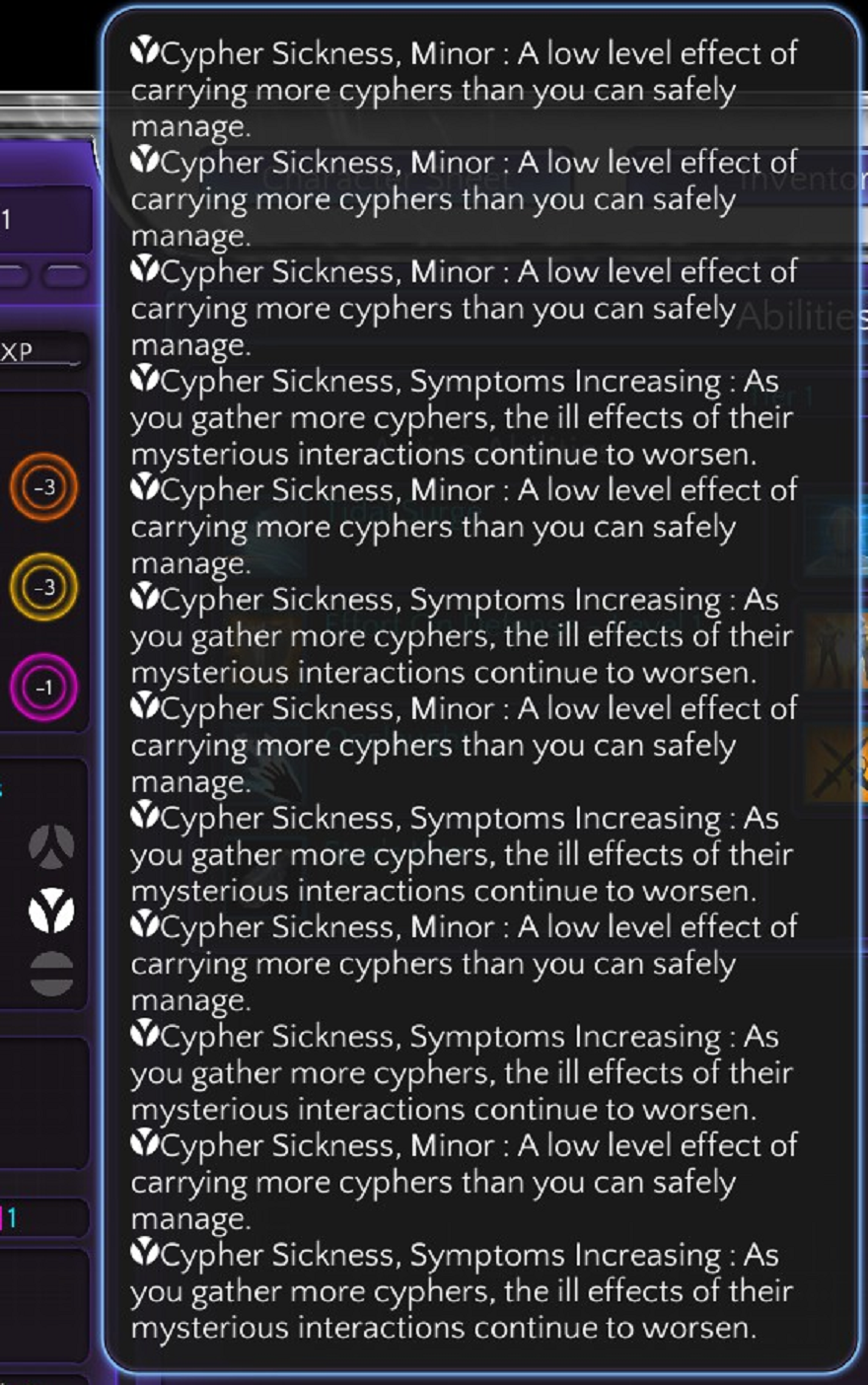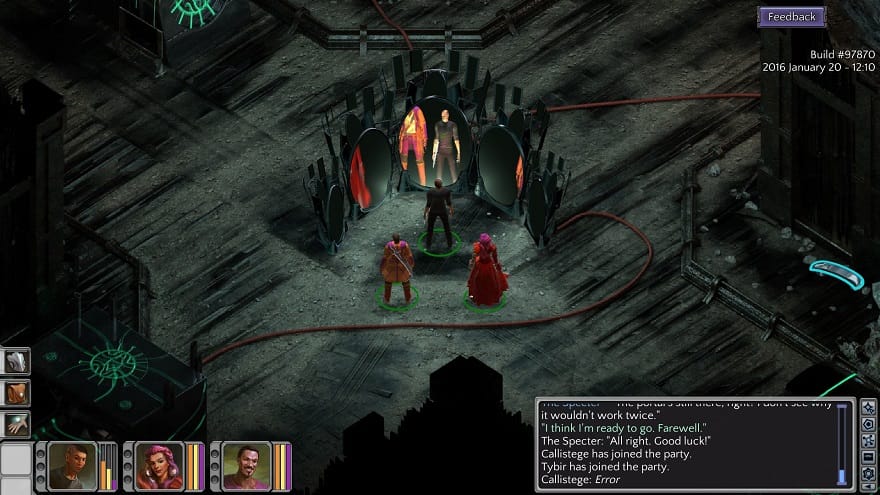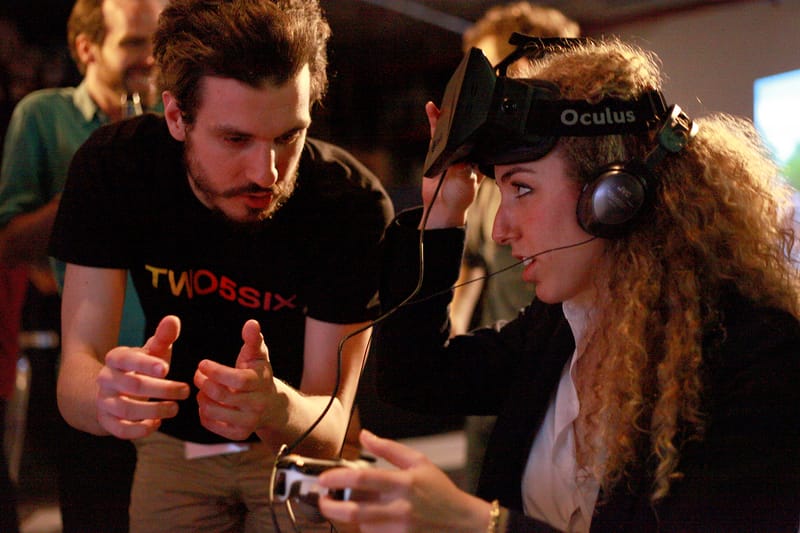Torment: Tides of Numenera is, in its own words, “chewy and full of strangeness.” The game’s beta sets players down in the city of Sagus Cliffs, where weird humans and alien “visitants” live in squalor beside buried spaceships. You meet citizens who can’t stop sprouting extra toes, others who drink and brood about psychic wars, and one who’s trying hard to stop a robot from having babies. They toil in the shadow of countless dead civilizations, as well as the shadow of the monumental Planescape: Torment (1999), whose themes, protagonist, and aversion to short sentences have been carried over intact to Monte Cook’s anything-goes Numenera setting.
The one constant in Cook’s screwball future is that nobody seems to have any idea what they’re doing. The instruction manuals for every space VCR went missing about a million years ago, and now people hit random buttons and hope for the best. And yet every skinless time traveler within the city limits is happy to dispense smarmy advice about how you, the Capable One, should live your life, just before they ask you to solve the riddle of the stars or repair the ancient machine that their dick is stuck inside.
I came away from the beta with a wealth of advice and aphorisms passed on by talking bugs and sentient triangles. Rather than trying to judge the unfinished game (which, I should disclose, I backed on Kickstarter), I’ve instead reviewed the advice that the characters in it were eager to give me.
“Everything is worth seeing, even the boring bits. Take your time, talk to everyone you meet, and keep your eyes open!”
Some busybody told me this early on—it might have been Otero, one of those eccentric videogame characters who hangs around the entrance of a city giving people tips. It’s standard advice for questing minds: stick your hand in every burrow, follow every turtle. I had no idea how much trouble this approach would cause in Torment.
As I exhausted every dialogue tree (including that of Otero, who is himself one of “the boring bits”), I was given dribs of XP and several single-use items called Cyphers as rewards. These can only be consumed during a Crisis, one of the game’s hand-crafted combat encounters. But Crises are so rare, and so avoidable, that I missed every chance to use the Cyphers I collected. For the crime of being given these useless items (I believe I had four) by grateful NPCs, the game afflicted me with “Cypher Sickness,” a stat-reducing ailment.
It took me a while to take Cypher Sickness seriously. You can’t sell items or give them to other party members in the beta, so I wasn’t sure I could reduce my Cypher load at all until I found a Crisis. In the absence of other ideas, I resolved to keep picking up Cyphers and hope for a hair of the dog cure. I soon became very sick indeed:

“Never buy lunch from Meatmonger before you go for a chat with Master Artisan.”
A sort of science wizard warned me here not to buy steaks underground from a man who cuts them from vats of endlessly regenerating meat—the food gave him (the wizard) stomach trouble once. His recounting of this event was neither amusing nor useful. By this point my character’s very bones were afire with Cypher Fever.
Due to the beta’s restrictions on merchants, the Meatmonger couldn’t sell me anything anyway, so I was safe from his steaks. I stopped by an inn in an attempt to rest and dispel my item cancer, but the bed merchants would not accept my “shins” (the local currency). Disgusted, I threw my Cyphers on the ground at their feet. This also did not cure my Cypher Sickness.
“I’m sure the Cult of the Changing God will hold the answer.”
The cultists did not hold the answer. Instead they made me fix their multi-dimensional clock, ignored my requests to rent a bed, and directed me toward the next group of needy souls.
“The avatrol whistles while it runs, a fearful sound. Perhaps even for the avatrol.”
I had to pass a speech check to receive this wisdom, so you know that it’s good. It came from what looked like a floating glass eyeball wearing a robe. There are no “avatrols” in the beta, but this observation made me wonder if they’re one of those high-strung animals that attack their own reflections, as some cats do.
As it happens, I finally cured my character’s Cypher Sickness by accidentally killing him with a mirror. As in Planescape, the protagonist of Torment wakes up again right after “death,” so this turned out to be an easy cure for status effects. I wish I’d found it sooner, but there isn’t much in the beta that can kill you.

“You can laugh, but the old saying is undeniably true: the tongue that wields the words is deadlier than the hand that wields the sword.”
The old saying “the pen is mightier than the sword” is much snappier than this one, and it’s troubling to see the citizens of the Ninth World fattening up our truisms with their own alliteration. This came from Dhama, one of the grizzled psychics in the Fifth Eye, a bar cut from the same cloth as the Smoldering Corpse.
He’s not wrong. Intellect towered over the game’s other stats in my playthrough. The Torment beta isn’t balanced yet, but the original Planescape gave players little incentive to build a character for anything but conversation. It’s hard to tell before release whether developer InXile sees that as something to emulate or correct.
“When one stands at the utmost peak of the highest mountain, an advance is no better than a retreat: all change is decline.”
Spoken by a rotten old alien brain in a flashback told Choose Your Own Adventure-style. (Although they’re becoming a cliché in Kickstarter RPGs, Torment’s CYOA segments punch above their weight.) This advice demonstrates a commendable bias for inaction, which is one of the performance evaluation metrics at my dream job. But in the game, it’s also a laudable example of purposeful bad advice: the brain wants to delay you, not advise you. As you waste time listening to its philosophy, pondering all the “boring bits,” it marshals its strength to attack.
It’s true that the Numenera setting can feel indulgent, inclined to let too many far-flung concepts share the stage at once. But its shifting rules and narrative frames give the Torment writers more room to misdirect and disorient their players. It’s exhilarating to watch a game lie with conviction (as it does again later, in another note of false authority that I shouldn’t spoil), leaving players to work their own way to the truth. Of all the promising and exasperating signs of the Torment beta, this narrative courage stands out as the best reason to return.
“You might ask Mapper, over there by the shanties. He’ll be the one with the maps on his skin.”
By far the greatest advice I received in the Ninth World. Mapper was indeed right over there. He had the maps on his skin. He knew where I should go next.





